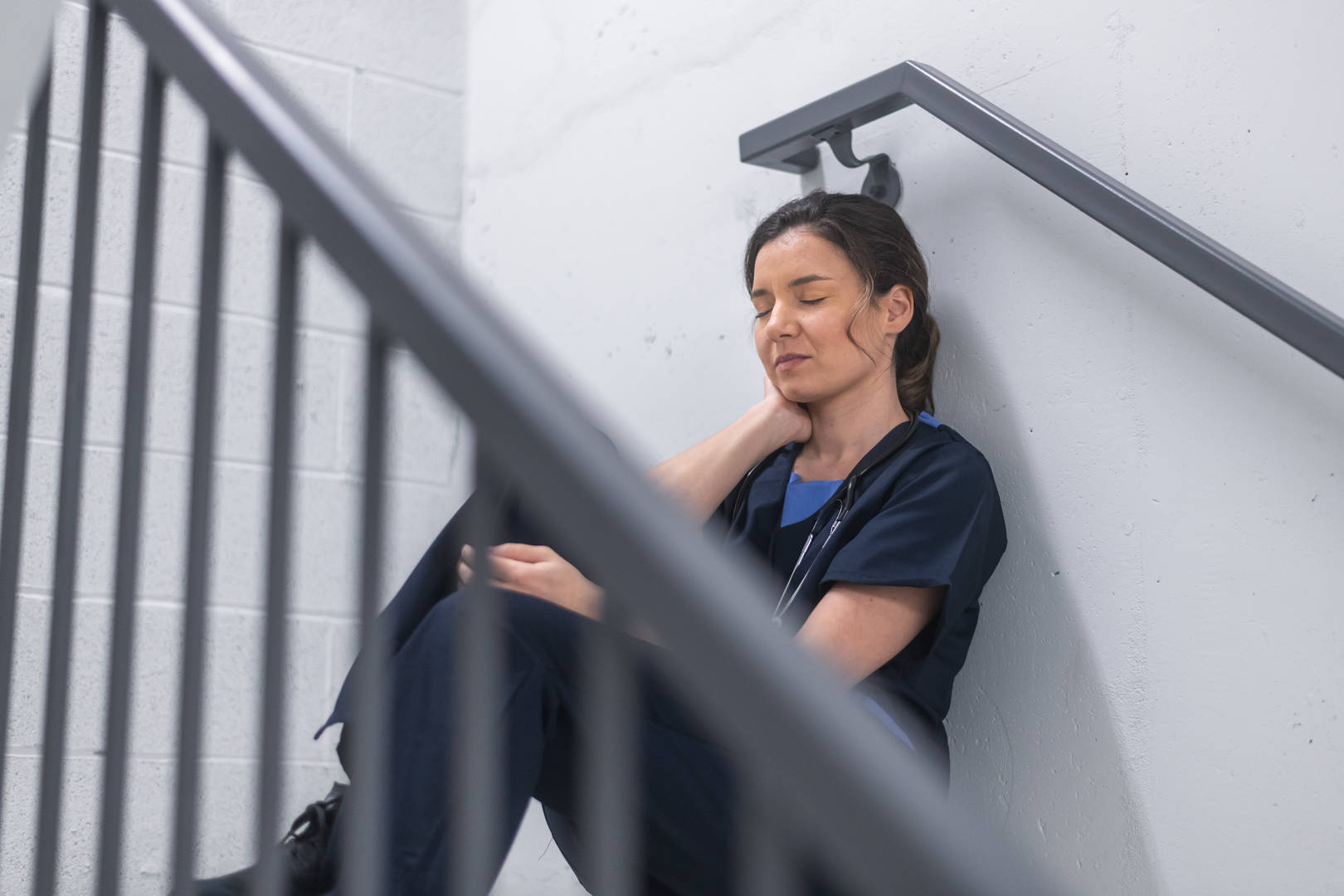Out of the darkness
By MWI Animal Health
Resources to help veterinary professionals address mental health issues

There is a long-simmering crisis in veterinarian mental health.
"Being a veterinarian takes a lot more than my medical training, which is something no one told me in school. I'm expected to be a counselor, an educator, a team leader, a financial advisor. When we can't possibly fit this impossible standard, when we can't possibly fit in one more pet without compromising the care of others, we are attacked by our clients for being incompetent and not caring."
Those words came from Melanie Bowden, DVM, in a 2020 TED Talk that's been viewed over half a million times.
Bowden adds, "I empathize with my colleagues about at the end of a really bad shift, they get to a dark place."
Personally, she knew three colleagues who died by suicide since 2016, and all three were within five years of starting their veterinary medicine careers.
Those were not isolated cases. As she cites in her talk, 10 percent of veterinarians who died between 2010 and 2020 died by suicide.
According to studies published by Merck Animal Health and the American Veterinary Medical Association:
A beacon of support
Some of the veterinarian mental health issues today's professionals face include compassion fatigue, often accompanied by context switching; burnout caused by long hours and increased demands on time; unrealistic expectations from and demeaning interactions with clients; and debt and other financial stressors.
Having someone to talk to and destigmatizing asking for help are the foundations of getting better and stronger. It's under that guise that Nicole McArthur, DVM, founded Not One More Vet (NOMV), after the suicide of Sophia Yin, DVM, MS, a renowned veterinarian and animal behaviorist, sent shock waves through the animal health community.
What originally began as a private Facebook group for peer support has turned into a nonprofit that provides financial and emotional support for animal health professionals in crisis.
According to NOMV Executive Director Darlene Bos, "Our basic mission is to provide resources, education, and support for veterinary health professionals, with the vision of changing the face of the industry so that it is a more mentally well place."
Client expectations and interactions
Pet parents might not understand everything their vet is dealing with on a particular day. Context switching is a mentally taxing aspect of the job, with a veterinarian having to go from an appointment to euthanize an older, sick pet and comfort the family to an appointment to meet an excited new client and their brand-new kitten without a break to decompress. Such cycles repeat themselves throughout the day, contributing to veterinarian burnout.
Another contributing factor to veterinarian distress is compassion fatigue. They want to help as many animals as possible but often leave work upset things didn't go as planned. Pet owners' sometimes unrealistic expectations about what the veterinarian can do for certain pets compound compassion fatigue. Clients without pet insurance may lash out when faced with "sticker shock" over the costs of procedures.
"We want to partner with students and set up the expectation it's OK not to be perfect. It's OK to ask for help when you need it.”
Bri Golob
Negative client interactions chip away at veterinarians' love for the profession. Clients are unaware of the power of their words. The Merck Animal Veterinary Wellbeing Study showed 70 percent of veterinarians ranked cyberbullying as a topic of concern for their profession.
"[Pet parents] don't realize that the words that they say, in terms of: You're in it for the money, or if you really cared about animals, you would save my dog, matter. Those things are hurtful and detrimental to somebody who genuinely would love to save absolutely every single animal that they could," says NOMV Programs Manager Bri Golob.
NOMV launched a pet parent webpage to educate owners about the stresses veterinarians face and to promote positive interactions. The request of a practice that didn't know how to explain the negative impact of clients' treatment on staff's mental health led to the page's creation. The practice drafted a contract, and now every client must read the pet parent page. Looping owners into this understanding about mental well-being is necessary to make any kind of progress.
Student debt as a stressor
The Merck Animal Health Veterinarian Wellbeing Study showed the most common age range for veterinarians to have suicidal thoughts is 26-34, right as they are starting their careers.
Increasingly, student loan debt has placed a huge stressor on new veterinarians. In fact, age and debt, along with the personality trait of neuroticism are considered predictors of low well-being.
Consider that veterinary school, on average, costs almost as much as medical school, yet the compensation levels are not the same. The American Veterinary Medical Association reports the mean educational debt is $157,146. Student loan debt is outpacing income by a factor of 4.5. The Merck study shows 91 percent of veterinarians rank student loan debt as a leading concern for their profession.
It's not surprising then, that veterinary professionals' well-being is lowest among younger age groups. Thirteen percent of those ages 18-34 categorize themselves as "suffering." This compares to 9 percent across all groups.
NOMV understands how financial stress can spiral to create other stresses. In 2021, according to Bos, the support grant program gave away $153,870 to individuals in financial crisis. Bos explains, "Getting those financial burdens off can often allow people to focus more on their mental wellness."
Personalized help
Launched in early 2022, the Lifeboat app provides peer support for veterinary professionals in mental health crises. NOMV partnered with the veterinary social work program at the University of Tennessee and the psychological sciences department at Auburn University to create the app.
Lifeboat matches each user with three people who share a similar professional background (veterinary technicians with veterinary technicians; small animal veterinarians with small animal veterinarians, etc.). Through the app, these peers can anonymously speak with the user, help them set and follow-up on goals, and provide a sounding board for talking through what they need to get to a better place mentally.
"What if we could do something so that person doesn't need to be in crisis in the first place by changing the entire profession?"
Bri Golob
Like NOMV's origins as a Facebook group, this latest iteration is grounded in peer support. Fellow professionals often have the same lived experiences, so conversations can quickly progress past the surface level and into strong connections.
Though stopping the immediate crisis is important, NOMV understands veterinarian mental health starts before entering the clinic. They are starting a student support and mentorship committee. Established professionals will work with students to help them understand how important it is to advocate for themselves and setting boundaries. "We want to partner with students and set up the expectation it's OK not to be perfect. It's OK to ask for help when you need it," says Golob.
Showing up for each other
Modeling proactive ways to address mental health is one of the best ways veterinarians can help each other. When people are open and honest and admit, "I'm having a hard day, this is how you can help me" or "I'm really grateful I'm able to see a mental health provider and get that professional support," it removes some of the stigma about talking about mental health in the workplace.
To encourage the use of mental health resources, NOMV will launch a crowdsourced database, NOMV's List. Users can share their experiences, positive and negative, to help their peers make educated decisions about where to turn for help.
Recognizing that culture is an important contributor to well-being, later this year, NOMV will launch a program to assess practices' commitments to fostering healthy work environments. "What if we could do something so that person doesn't need to be in crisis in the first place by changing the entire profession?" asks Golob.
Under the CLEAR Blueprint program, veterinary practices will undergo a rigorous assessment to become verified. The program will examine what aspects of staff well-being a practice excels at and what areas need improvement. After implementing programs, their staff will reevaluate to see if positive changes have made an impact.
Golob continues, "We want it to be hard, and we want it to be important and something that they're really invested in because we think it really matters." Clinics can display their CLEAR Blueprint certification to attract top-tier talent and promote themselves as an employer who places importance on veterinarian mental health.
By focusing attention on mental wellness and stopping the stigma around talking about suicide, those in crisis will no longer feel alone.
Not one more vet should die by suicide.
If you are in crisis, please call the National Suicide Prevention Lifeline at 800.273.8255





